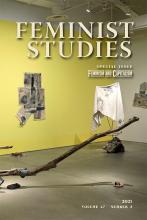"Why is feminism so good at understanding capitalism?" A recent special issue of Feminist Studies on “Feminism and Capitalism” opens with this question. It features articles by Jiwoon Yulee (PhD ’18, Postdoctoral Researcher, Arizona State University) and Priti Ramamurthy. As the editors of Volume 47, No. 3 articulate, “Feminist activists and scholars theorize capitalism as a political and economic conjuncture, a hydra-headed monster configuring and distributing power unevenly across difference to produce multiple interrelated crises.” They issued the call for this special issue before the start of the COVID pandemic, at a moment when multiple indexes of inequality in multiple locations around the world were already unconscionably high. The articles included in the issue analyze these crises, including instances exacerbated by the pandemic, and “underscore the urgency of feminist interrogations of capitalism.”
Jiwoon Yulee’s article, “A Feminist Critique of Labor Precarity and Neoliberal Forgetting: Life Stories of Feminized Laboring Subjects in South Korea,” opens with this question: “What if the history of global capitalism were written by those who have never been granted full security, identity, entitlement, citizenship, or rights through formal labor?” Through an analysis of three oral life histories of middle-age female janitors in South Korea, presented alongside the history of South Korea from a developmental state to the neoliberal reform era, Yulee argues that the “social reproduction of feminized labor [is] a condition of possibility for the developmental state’s neoliberalization.” She demonstrates that an understanding of labor precarity as caused by contemporary economic reform forgets older histories of feminized labor.
Priti Ramamurthy’s article, co-authored with research collaborator Vinay Gidwani, is titled “The Gender of Value: Punctuated Violence and the Labor of Care.” They analyze the life history of one woman, Usha, to theorize how violence shapes the everyday lives of working-class women in contemporary India who are members of translocal households moving between urban and rural environments. Violence—domestic violence in women’s stories of migration and return, as well as the state violence of neglect and precarity—can be banal or brutish and serves as a punctuating vector in the relationship among social reproduction, carework, and future aspirations. Ramamurthy and Gidwani track how violence punctuates: “that is, sections the experience of life to motivate working-class women over their life-course to care or not to care.”
Feminist Studies 47.2 – Global Intimacies: China and/in the Global South
A previous special issue of Feminist Studies, focused on the so-called rise of China as a key node of intimate and unequal global relations, features an art essay co-authored by Christina Yuen Zi Chung and Sasha Su-Ling Welland. In “Wandering Geographies: Aesthetic Practice along China’s Belt and Road Initiative,” they curate an unruly selection of artists who work in disparate locations along this “New Silk Road.” Chung and Welland argue that these artists' aesthetic attention to the materiality and movement of bodies, things, resources, and ways of seeing gives form to hidden histories of gendered labor, care work, environmental extraction, diaspora, and displacement. These artists and their works unmoor taken-for-granted notions of China, North, and South, cautioning us against using these terms as shorthand in feminist analyses of China’s global reach.
